About Bio Detectives: We are two life science graduates from Oxford University, now living in England and Australia respectively. Upon leaving university in 2014 we set up Bio Detectives to follow science stories around the world, while making our topics accessible and (hopefully) engaging. Please do come and take a look at our articles!
Bio Detective’s Homepage: http://biodetectives.co.uk
Bio Detective’s Twitter: https://twitter.com/BioDetectives
We have compiled this list of some of our favourite science books with a particular focus on books that might be of interest to anyone who is looking to further their knowledge of biology, whether that be through education or personal research. They are in no particular order, and have been chosen to cover a spectrum of topics!
 1. Elegance in Science: The Beauty of Simplicity by Ian Glynn
1. Elegance in Science: The Beauty of Simplicity by Ian Glynn
Science may remain shrouded in mystery and/or nerdish eccentricities (thank you, Big Bang Theory, your existence is both a blessing and a curse) but it is rarely associated with elegance. Leave that to Audrey Hepburn and her ilk, right? Well, no – in this book, particularly elegant examples of scientific thought, theory and experimental design are skilfully dissected by Glynn. This book altered my perspective regarding scientific research and I think it could be an eye-opener to a non-scientist.
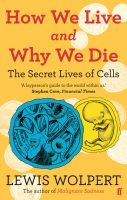 2. How We Live and Why We Die: The Secret Life of Cells by Lewis Wolpert
2. How We Live and Why We Die: The Secret Life of Cells by Lewis Wolpert
Wolpert is a prominent cell biologist. In this concise account, he takes us on a whistle-stop tour through the cell, describing with clarity how we develop from a single cell at fertilisation to fantastically complex organisms. Imagine you can shrink to the size of a nanoparticle and tunnel through the blood vessels down to the capillaries, then pop through the membrane of a single body cell, from where you can observe the beautifully organised machinery within. Wolpert does a good job in neatly summarising swathes of information into one easy-to-read book. Highly recommended!
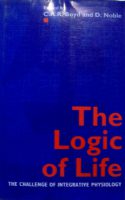 3. The Logic of Life: Challenge of Integrative Physiology by C Boyd and Denis Noble
3. The Logic of Life: Challenge of Integrative Physiology by C Boyd and Denis Noble
Anyone working in biomedical science constantly hears talk of the importance of an integrative approach. This book draws together several different authors, each giving their perspective on the study of physiology, from more molecular to integrative angles. What’s really striking about this book it how it skilfully draws together disparate aspects of biological study, thus subtly illustrating how the overlap between different disciplines governs research strategy.
 4. The Brain That Changes Itself: Stories of Personal Triumph from the Frontiers of Neuroscience by Norman Doidge
4. The Brain That Changes Itself: Stories of Personal Triumph from the Frontiers of Neuroscience by Norman Doidge
This is a clearly written insight into neuroscience and brain plasticity, which is rather anecdotal but compelling. In one case study, a stroke victim recovers the ability to walk despite having experienced damage to (apparently) 97% of the nerves connecting their cerebral cortex to the spine. Doidge is a true enthusiast; his belief that we will soon be able to overcome devastating brain injuries is optimistic and makes for an enjoyable read.
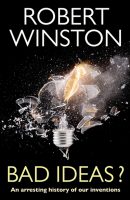 5. Bad Ideas? An Arresting History of Our Inventions by Robert Winston
5. Bad Ideas? An Arresting History of Our Inventions by Robert Winston
This book addresses human creativity and the drive to invent – as well as whether this has been to our benefit or our detriment. Winston approaches human development of agriculture, weaponry and medical care – and deftly illustrates how our supposed ingenuity has resulted in clumsy outcomes. Winston is a highly engaging writer, with a sense of humour that covers the toughest concepts with a light touch.
6. Life Ascending: The Ten Great Inventions of Evolution by Nick Lane
Ever wondered how the eye evolved, or why organisms use sex to reproduce? Look no further – this is a fantastic book, which tackles complex questions with ease. Whatever your interest in biology, read this book. It’s that simple. We love this book!
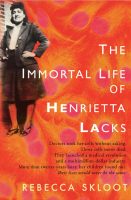 7. The Immortal Life of Henrietta Lacks by Rebecca Skloot
7. The Immortal Life of Henrietta Lacks by Rebecca Skloot
We wrote about Henrietta Lacks and her legacy here. Henrietta was a black American woman who died in the 1950s from aggressive cervical cancer at the age of 31. Her tumour, however, lived on – and founded modern cell culture, an essential technique in medical research. Henrietta’s cells are known as ‘HeLa’ and are used in millions of labs worldwide. Rebecca Skloot spent years piecing together the remaining fragments of Henrietta’s story. She met the Lacks family and found that, while their mothers tissue has saved countless lives, they cannot afford medical insurance. This book elegantly traces the origins of scientific methodology that is indispensable to researchers today; it approaches the deep injustices experienced by Henrietta’s family and others.
8. Life at the Extremes: The Science of Survival by Frances Ashcroft
Humans are pretty good at surviving the planet’s extremes, despite our relatively puny bodies (that is, puny compared to fleas, spiders, cheetahs – almost every organism really!). But how do we (well, some of us) cope with extremes of temperature, altitude and depth? Ashcroft explores these questions, explaining why astronauts have trouble standing after returning to Earth, how Japanese pearl divers can attain extreme depths without dying and why English children wilt in a sub-tropical summer while their Middle Eastern counterparts thrive. She thoroughly explores our physiological adaptations that enable such feats of survival with a combination of fieldwork and laboratory results. Whether you’re a mountaineer or a couch-surfer you are sure to find this fascinating.
9. Genome: The Autobiography of a Species in 23 Chapters by Matt Ridley
This one is slightly out of date now as it was published in 1999 and is also a bit of a cliché, and as such you may have read it already. I remember being at my Oxford interview ( – H.) and asking the other candidates which books they had mentioned in their personal statement – almost everyone mentioned this book. If you are planning on applying to university it’s a good idea to read what the competition is reading, right?! Having said that it is also a really interesting and well-written book, framed as an autobiography of the genome with one chapter per chromosome. If you are interested in genetics (or even if you’re not, genetics is pretty fundamental) I think this is still definitely worth a read.
 10. On the Origin of Species by Means of Natural Selection, or the Preservation of Favoured Races in the Struggle for Life by Charles Darwin
10. On the Origin of Species by Means of Natural Selection, or the Preservation of Favoured Races in the Struggle for Life by Charles Darwin
Well, we couldn’t very well not mention it, could we? We think this speaks for itself really. It is the book in which Charles Darwin introduced his theory of evolution by natural selection, it’s probably one of the most famous books in the vast field that is biology, so go on, give it a go. Darwin’s writing is clear; he describes his findings in meticulous detail; as a reader many years on it is a wonderful opportunity to see how he reached his revolutionary conclusions regarding evolution by natural selection. Whether you’re a scientist or a linguist his obvious wonder as he describes natural phenomena is enthralling.
We hope you enjoy our selection of life science books!
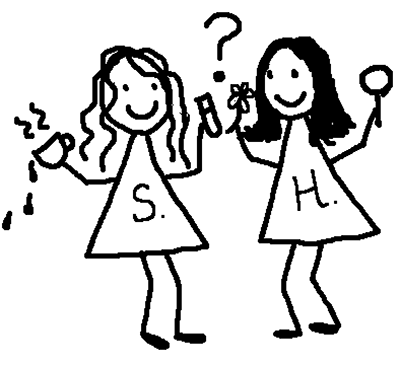
Reblogged this on Literally Science and commented:
10 Great Books on Life Sciences, selected by the Bio Detectives. Check it, and them out 🙂